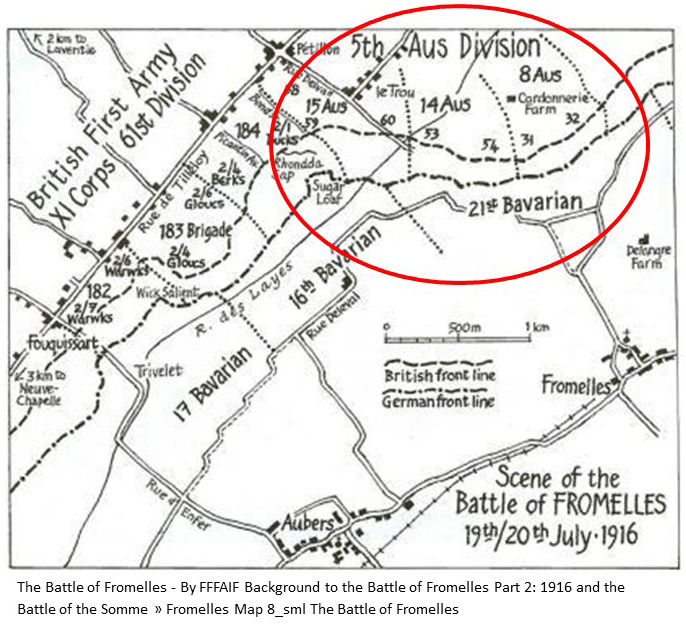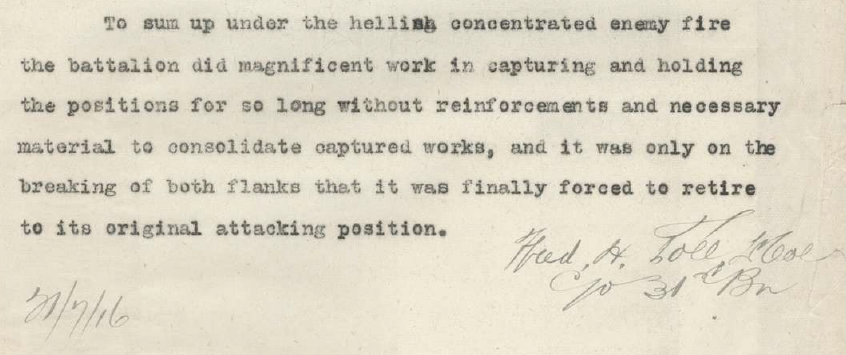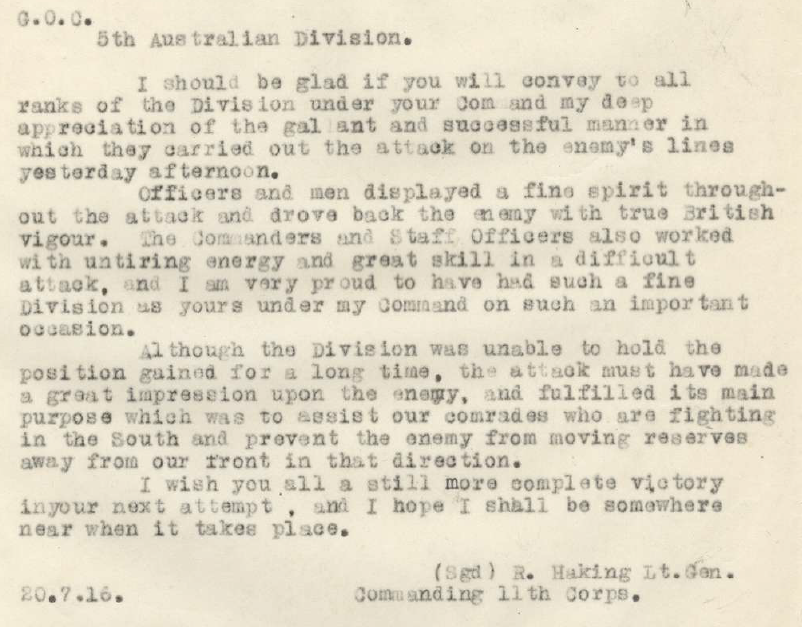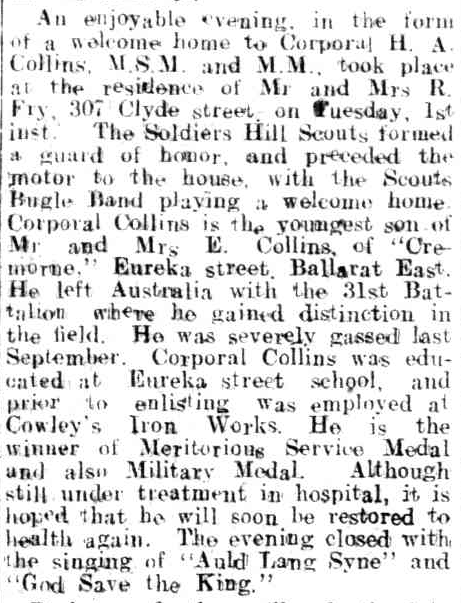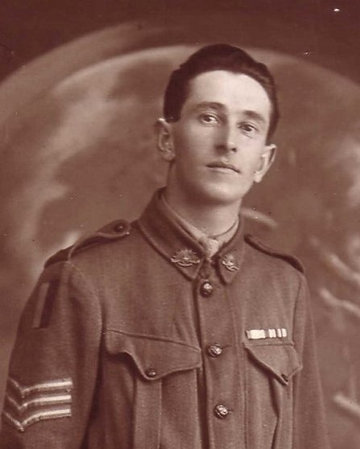
Frank Austin COLLINS
Eyes brown, Hair dark brown, Complexion fair
Frank and Herb Collins, Their Background
We acknowledge with thanks the story, photos and research by Amanda Bentley published on her Facebook page (Ballarat & District in the Great War). The following story is largely a reproduction of her work with some editing and additions to highlight the Fromelles aspects of the Collins brothers’ stories.
The Collins boys’ great grandparents, George and Annie Collins, arrived in Ballarat from Eton, Buckinghamshire, England in 1854 when their son, Edward was just 4 years old. In the mid-1850s the tent town was at the very height of its gold rush. In 1863, George and Annie Collins became the publicans of the Cremorne Hotel in Eureka Street – a fine establishment of brick and stone ‘fairly well furnished and well conducted’.
Edward married Amelia Coyte in 1878 and they had five children: Edward George (1881), Annie Rachel (1884), Walter Samuel (1887), Frank Austin (1893) and Herbert Alan (1899).
Both Frank and Herb were educated at the Eureka Street State School, which was a decent walk from home, there and back each day. One of the noted schools of the era, Eureka Street was substantial in both structure of buildings and the standard of education. Frank and Herb both did well under the tutelage of the Eureka Street teachers.
After leaving school, Frank was accepted as an apprentice at Cowley’s Eureka Foundry in Rodier Street, Ballarat East. The four-year apprenticeship trained him as a motor mechanic and he later took up a position as a motor driver. Herb would later join him at Cowley’s, where he worked as a fitter.
When not working, the boys found time to become involved with the Ballarat Harriers athletic club. In the photo below, Frank is Herb’s trainer, with a towel casually tossed over his shoulder.
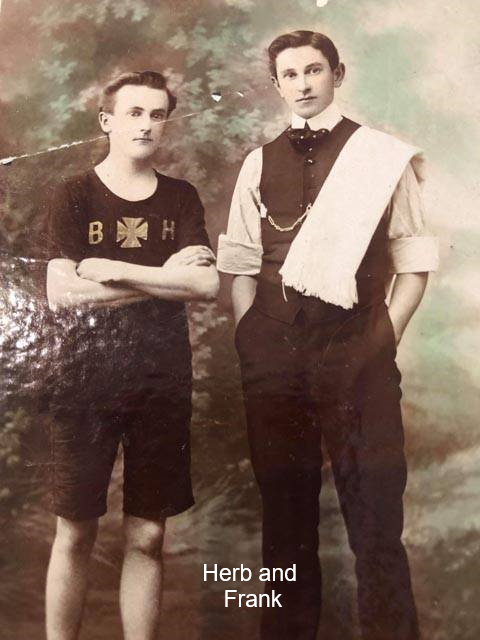
Joining Up
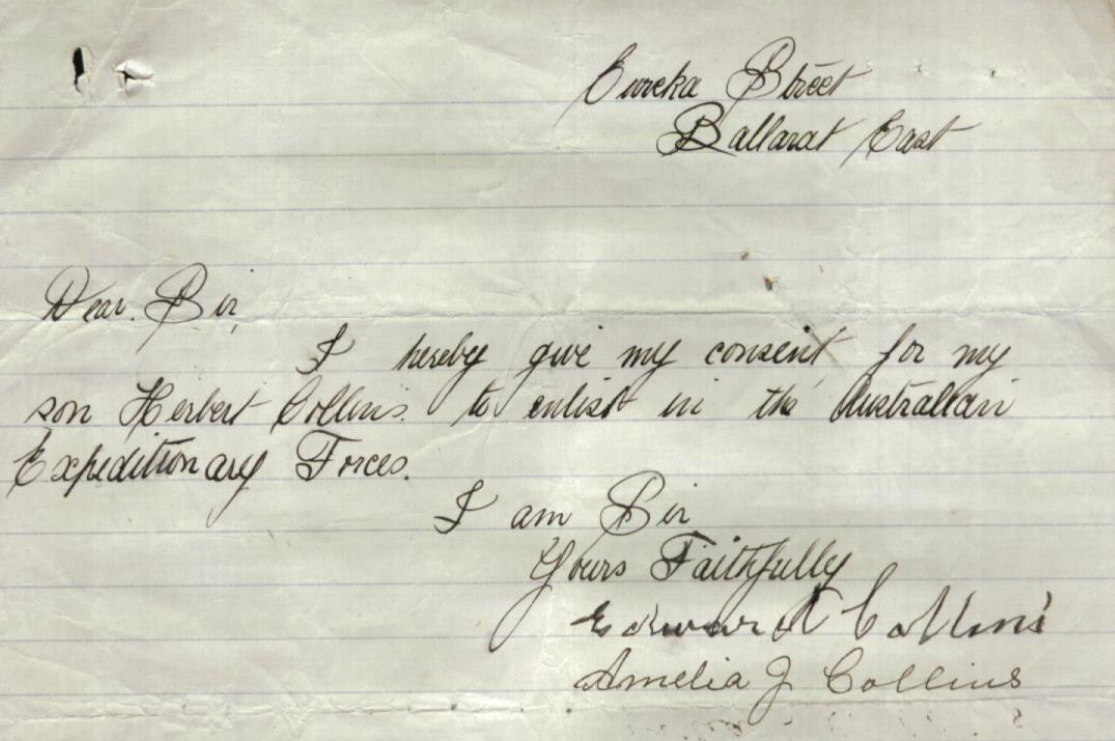
The decision to enlist in the AIF in mid July 1915 was either a combined one on behalf of the Collins brothers or Frank enlisted to look after Herb. At that time, Herb was well underage - he claimed to be 18 years and 4 months, when he was in fact just 16. In any case, he had his parents' support.
The boys went straight into training in the camp at Flemington Depot on 19 July 1915 and they were assigned to D Company of the newly raised 31st Battalion, with consecutive regimental numbers – Frank 831 and Herb 832.
Shortly before leaving for Egypt, Frank was appointed to the rank of Lance Corporal.
The 991 soldiers of the 31st sailed from Melbourne on 9 November 1915 aboard the troopship Wandilla, stopping briefly in Fremantle on the way through.
Just out of sight of their homeland, several Ballarat boys – including Frank and Herb – partook of what was rapidly becoming a tradition of departing troops: they wrote a note, placed it in a bottle and threw it into the ocean:
“…Will the finder of this card kindly forward same to "The Ballarat Courier," Ballarat, Victoria. Appended are the names of some Ballarat boys in D Coy, 31st Battalion, 8th Brigade, and the boat is just leaving Fremantle now en route for the front.
A.Wilson, J. Allisey, C. C. Coutts, H. E. Brittain, C. Greenaway, F. A. Collins, W. Hicks, J. Lyons, J. P. Garvey, C. W. Tucker, F. Rawlings, Bert Wallace, H. A. Collins, and H. Phillips.
All the above are in good nick for Turks or any others…”
Mr Evander McMillan of Beaconsfield, Western Australia discovered this message, written on a YMCA postcard and inserted into a ‘French glass fruit bottle,’ at Robb's Jetty. He complied with the request and forwarded the card to the newspaper.
In Egypt
The Wandilla docked at Port Suez exactly four weeks after leaving Melbourne. Their initial assignments were in Zietoun, Serapeum and Tel el Kebir, training and guarding the Suez Canal. When they left Serapeum there were no trains for the move and were transported for the 60 kilometre trip in “dirty horse trucks”. At the end of March, they were moved to Ferry Post and Duntroon Camp and were in Moascar by the end of May.
While Herb was able to completely enjoy the experience of a new, exciting country, Frank was not so lucky. He was admitted to hospital in Ismailia suffering from a painful abscess. After treatment he was able to rejoin his brother in camp. The months passed in training and sightseeing, but by the time the 31st Battalion was transferred to France, the men were all heartily sick of Egypt.
The Western Front – Fromelles
On 15 June 1916, they were on their way to the Western Front, taking a train from Moascar to Alexandria to board the troopship Hororata. There was five-day journey to Marseilles.
After their arrival in on 22 June, they were immediately onto trains to Steenbeque, 35 kilometres from Fleurbaix, arriving on 26th June.
The 31st with a battalion strength of 979 soldiers was into the trenches in relief of the 15th Battalion on 11 July, just one year after the Collins brothers’ enlistment. After their first experience in the trenches, they were relieved by the 4th NZ on the 16th. The following day was the original date planned for the attack, but bad weather caused it to be postponed.
On July 19, Frank and Herb were back into the trenches and in position at 4.00 pm for an attack. The assault began at 5.58 pm and was in four waves, with Franks' D Company platoons in the 3rd and 4th waves:
“Just prior to launching the attack, the enemy bombardment was hellish, and it seemed as if they knew accurately the time set”
The pre-battle bombardment had a significant impact on the German first line trenches and the 31st quickly advanced to their second line, which was mostly ditches filled with water. Even with the initial support, they remained under heavy artillery from both sides.
Unfortunately, with the success of their attack, ‘friendly’ artillery fire caused a large number of casualties. They were able to take out a German machine gun in their early advances, but they were being “seriously enfiladed” from their left flank. Fighting continued throughout the night, with heavy firing from concealed machine guns from Delangre Farm and houses.
At 5.30 am the Germans attacked from both flanks in force and with bombing parties. Having only a few grenades left, the only resistance the 31st could offer was with rifles. According the AWM War Diaries, “The enemy swarmed in and the retirement across no mans’ land resembled shambles, the enemy artillery and machine guns doing deadly damage.”
The 31st were out of the trenches by the end of the day on the 20th. The headcount was just 512 soldiers of the 979 who began the battle.
Amongst the casualties was Frank Collins. He was wounded during the early stages of the action, with shrapnel wounds to his head, chest and foot, but was fortunate that none of these were serious. He was sent for treatment to a hospital in Boulogne.
Herb was extraordinarily lucky – he came through without a scratch.
The bravery of the soldiers of the 31st was well recognised by their own Battalion commander Frederick Toll and Lt. General Haking.
After the Battle
Even given the devastating results of the battle, the 31st was back in the trenches on 31 July, keeping their position secure.
When Frank returned to his unit on 15 August, the 31st was in billets at Rue-Biache near Fleurbaix, a short distance from the Fromelles sector. Just five days later Frank was promoted to the rank of Corporal and it was not long before Frank was promoted again, earning his Sergeant’s stripes on 15 October.
Just over two weeks later, however, Frank was back in hospital, with a recurrence of the abscess that had caused issues in Egypt. This time he was sent to England for surgery at the 3rd Northern General Hospital in Sheffield.
While he was recuperating in the 2nd Auxiliary Hospital in Southall, London, Frank was the recipient of a pair of socks from a Miss Kathleen Walsh of “Lake View” at Leigh Creek, just east of Ballarat. She had knitted a parcel of socks that had been forwarded to the Red Cross for distribution. Frank wrote a very grateful and detailed letter in response:
‘…This afternoon I received a pair of socks from the Red Cross ladies, and in the toe of one was a note containing your name and address and kind wishes for the success and good luck of the recipient.
I come from very near your place. I am a Ballarat boy, and live in Eureka Street, next to the Cremorne Hotel. I have been in hospital here at Southall for some time, and have been operated on for the removal of a fistula, but I am now getting on fine.
It is sixteen months since I left Australia, and since then I have travelled a good deal, both in Egypt and in France. I have been in many a scrap with the Germans since coming to France on 19th July, and received three wounds while trying to turn Fritz out of his trenches at a place called Fleurbaise (sic). I got one in the head, one in the chest and one in the left instep. None of the wounds was of a serious nature, just bad enough to keep me in hospital for six weeks.
After rejoining my unit, I was in several charges, and was lucky enough to get through without a scratch. After spending a few months up near the Belgian frontier, our division shifted up to the Somme battlefields, and after spending a few weeks there I was invalided to England for the operation I spoke of.
The people in England make a great fuss over us, and do all they can to amuse and entertain us. Our Australian can always be sure of a good time wherever he goes in England.
One cannot speak too highly of the good work done by our Australian sisters and doctors in the hospital. They are simply grand, and do all they can to get us into good nick again. Nothing seems to be a bother to them. The French people also treat us exceedingly well. Considering that the majority of us know very little French, we get on well, and can always make ourselves understood.
Thanking you for your gift and kind message, Sgt. F. A. Collins…’
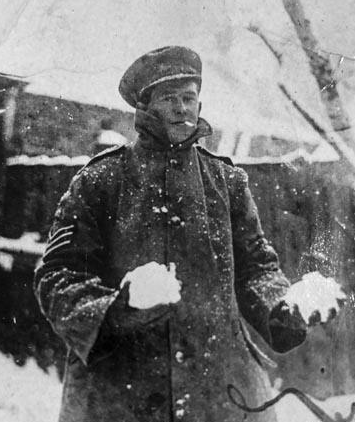
Returning to Battle
Since the 31st had suffered such a high casualty rate at Fromelles, it had been unable to perform an offensive role for the remainder of 1916.
After his recovery, Frank sailed back to France on 22 May 1917 and then spent another month behind the lines before rejoining the 31st at Senlis. The reuniting of the Collins brothers must have been a happy event.
By late September 1917, the 31st was preparing for the battle at Polygon Wood, Belgium. On the 22nd, Herb was assigned the role of Company runner, ferrying messages between D Company and the Battalion Headquarters throughout the fighting at Polygon Wood.
For the 31st, the battle ran from 26 to 28 September. Whilst Polygon Wood was a notable success for the AIF, it was far from being a good day for Frank Collins.
As the Australian troops pushed forward against the enemy, Frank was caught by the blast of a high explosive shell. A piece of shrapnel hit him in the left wrist, shattering the bones in his forearm. After being treated at the 6th Australian Field Ambulance, Frank was transferred to the 3rd Canadian Casualty Clearing Station, where he was stabilised and given emergency anti-tetanus serum and pain relief.
The following day, Frank was transferred to hospital in Étaples. It was there that his left forearm was amputated. Given the damage and the need to prevent the spread of infection, there was no practical chance of saving his arm.
On 4 October 1917, Frank was on the Hospital Ship Princess Elizabeth for evacuation to England. He was admitted to the Military Hospital in Frensham Hill the following day. Before the year was out, he would be heading home to Australia. For Frank Collins the war was over.
For Herb Collins, still only 18 years old, his leadership role in the War had only just begun.
Herb’s Heroics
Herb had already come to the attention of his commanders, ‘doing splendid work’ at Fromelles in July 1916.
During the battle at Polygon Wood on 26 to 28 September 1917, as company runner Herb was exposed at every step of the way to heavy enemy shellfire and the example he set for the rest of his company did not go unnoticed. He was promoted to Lance Corporal on 1 October 1917.
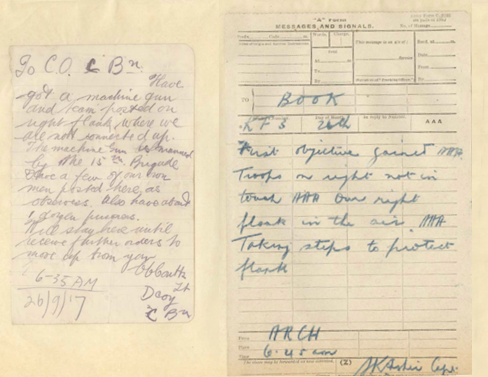
Herb continued to act as a runner into February 1918, through the 31st‘s deployment at Broodseinde Ridge as the Australians pushed forward to Passchendaele.
All of his good work to date had been brought to the attention of then Brigadier-General Edwin Tivey, Commanding Officer of the 8th Brigade, and on the Brigadier-General’s recommendation. Herb was awarded the Meritorious Service Medal on 17 June 1918. The recommendation commended Herb’s work as a company runner and that “he did splendid work during the operations around Ypres in September and October 1917” and that he “repeatedly carried important messages from Company to Battalion Headquarters under very heavy enemy shell fire, and has at all times set a splendid example to all ranks”.
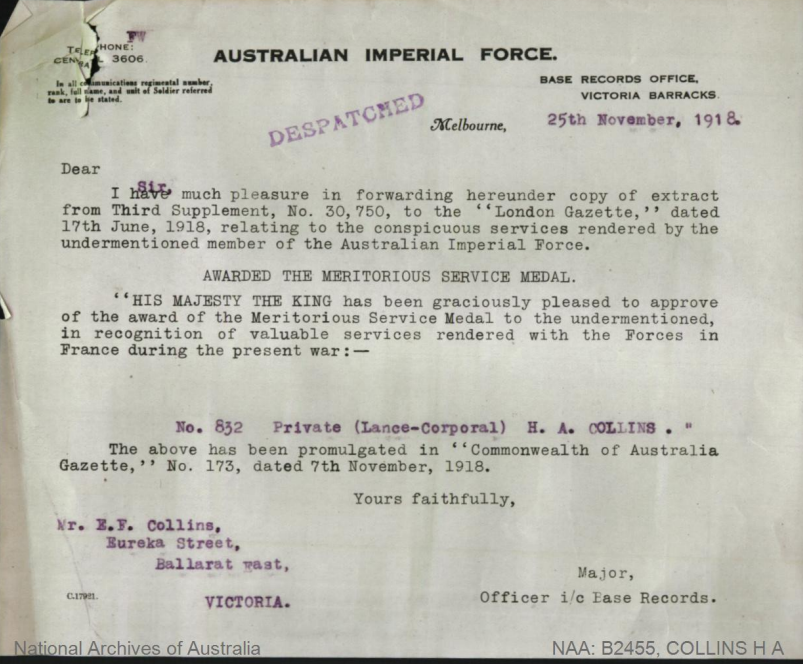
While the battalion was temporarily out of the line training and enjoying cricket matches, Herb was sent to the Australia Corps School on 9 July 1918. By the time he returned ten days later, the 31st was fighting in the Dernancourt sector, near Amiens, France.
The 31st Battalion was now pressing the retreating Germans as they moved back towards the Hindenburg Line. On 30 August, the 31st was taking heavy enemy shellfire near the village of Villers-Carbonnel.
As a temporary Corporal, Herb was responsible for leading his section as they moved across the Somme. The German artillery and machine-gunners peppered the advancing Australians.
Despite his youth, Herb showed remarkable bravery. ‘…He handled his command skilfully in attacking the enemy. He personally accounted for several of the enemy, and by his courage and coolness in the face of heavy fire set a fine example to his men…’
Major Richard Geddes, who was Acting Commanding Officer of the 31st Battalion, recommended Herb for the Military Medal and this was awarded on 19 October 1918.
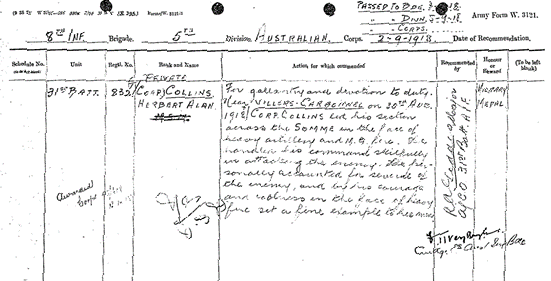
The last major action of the war for the 31st Battalion was in September 1918 when the 3rd and 5th Australian Divisions, and two American divisions attacked the Hindenburg Line across the top of the St Quentin Canal tunnel – a formidable obstacle in the German defensive system.
On the final day of September, with the desperate enemy throwing everything at the attacking troops, Herb was caught by a phosgene shell and badly gassed. He was eventually evacuated to England and was still in the Beaufort War Hospital in Bristol when the war finally ended.
Herb was able to enjoy Christmas 1918 on leave. Due to his record of service and the after-effects of the gassing, he was given the opportunity for an early return to Australia. He boarded the transport Lancashire on 7 February, arriving in Australia on 31 March 1919.
At the Melbourne Town Hall on 13 June 1919, Herb was presented with his Meritorious Service Medal by His Excellency, the Governor-General Sir Ronald Munro Ferguson.
After four years of service, Herb was still just 20 years old.
After the War
For Edward and Amelia Collins there was great relief that both their soldier sons had returned home, but the strain and worry had left a distinct mark. Edward Collins had been suffering from heart disease for at least two years. His death on 1 August 1919 was not unexpected, but it was still a particularly sad time for the family who had survived so much.
When Frank married his fiancée, Emma Margaret Bligh, at the Footscray Baptist Church, on 20 September 1919, the family was still dealing with their grief. Fortunately, theirs was a marriage of great love that was capable of helping Frank heal from his war experience and the loss of his father.
Over the ensuing years they lived in several Melbourne suburbs and Frank worked at various occupations – a French polisher, labourer, contractor and once again as a mechanic. They raised three sons – Des, Val and Austin – in what appears to have been a very happy home.
During the Second World War, Frank worked as the live-in caretaker of Capel Court in Collins Street, Melbourne, that housed the offices of the Department of Information. Late one night, Frank heard noises in the lane way next to Capel Court. He went down to investigate and found a US marine trying to hot wire his truck. Thinking quickly, Frank told his youngest son, Austin, “Son, get me gat (gun) and call the Yank MPs!” By the time the MPs arrived, Frank had whacked the marine on the head with his gun and had him in a headlock with his stump, much to the MP’s surprise. Not bad for a one-armed veteran!
Sadly, on Christmas Day 1949, Frank suffered a heart attack. He was taken to the Heidelberg Repatriation Hospital, where he lingered for three weeks. His death on 15 January 1950 was devastating. Em’s tender tribute to her husband of 31 years said it all, ‘At rest, sweetheart. Until we meet again.’
Life for Herb Collins was dramatically affected by the damage done by the phosgene gas. For the first few years after the war, he returned to the family home in Eureka Street. He resumed his pre-war occupation as a fitter but continued to suffer physically.
In 1924, he married Alice May Victoria Clugston and they settled in the Melbourne suburb of Malvern. They had two children – Alan John and Amelia Jane.
Despite the early death rate of those gassed on the Western Front, Herb survived remarkably well. Unlike his big brother, he lived a relatively long life and died on 21 August 1975 aged 76.
The Collins family service continued during World War II as both Des and Val, Frank’s elder sons, served in the Royal Australian Air Force. They were still training in England when Germany was defeated and war in Europe came to an end. Herb’s son, Alan, served as an able seaman onboard HMAS Lonsdale in the latter stages of the war.
Epilogue – the Message in the Bottle
In remembering that letter in a bottle, thrown into the ocean by a group of adventurous Ballarat boys, it is important to note that the fourteen young men who signed their names to that postcard paid dearly for their experience of war.
Fred Rawlings and Alex Wilson were killed in the Battle of Fromelles on 20 and 21 July 1916 respectively.
Charlie Coutts and Wallie Hicks were killed in action at Polygon Wood in September 1917.
Charles Walker Tucker died of wounds received during the Battle of Mont St Quentin on 3 November 1918.
Of the remaining nine soldiers, all but two were wounded in action.
A Final Note
The majority of the material above was researched and written by Amanda Bentley from the Ballarat & District in the Great War Facebook page. She closes with this:
“In telling the stories of Frank and Herb Collins two more pieces of that intriguing puzzle were finally put together. But that was only possible because of a chance encounter in 2010, just prior to the dedication of the new cemetery at Pheasant Wood, Fromelles. I was visiting VC Corner when I met a fellow Aussie who was there to mark the discovery of the remains of Ballarat’s Fred Rawlings – a friend of his grandfather, Frank Collins. Now, I am proud to be able to call Leigh Collins, a long serving member of the RAAF, my friend. The circle, it seemed, was complete.”
The Fromelles Association would love to hear from you

Contacts
(Contact: carla@fromelles.info or geoffrey@fromelles.info).
(Contact: army.uwc@defence.gov.au or phone 1800 019 090).
Donations
If you are able, please contribute to the upkeep of this resource.
(Contact: bill@fromelles.info ).
